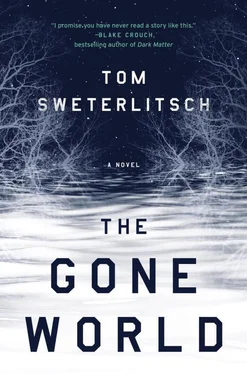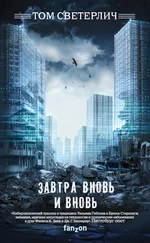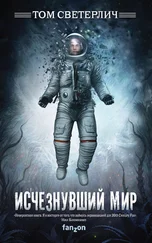Том Светерлич - The Gone World
Здесь есть возможность читать онлайн «Том Светерлич - The Gone World» весь текст электронной книги совершенно бесплатно (целиком полную версию без сокращений). В некоторых случаях можно слушать аудио, скачать через торрент в формате fb2 и присутствует краткое содержание. Город: New York, Год выпуска: 2018, ISBN: 2018, Издательство: G. P. Putnam's Sons, Жанр: Детективная фантастика, Триллер, на английском языке. Описание произведения, (предисловие) а так же отзывы посетителей доступны на портале библиотеки ЛибКат.
- Название:The Gone World
- Автор:
- Издательство:G. P. Putnam's Sons
- Жанр:
- Год:2018
- Город:New York
- ISBN:978-0-39916-750-8
- Рейтинг книги:5 / 5. Голосов: 1
-
Избранное:Добавить в избранное
- Отзывы:
-
Ваша оценка:
- 100
- 1
- 2
- 3
- 4
- 5
The Gone World: краткое содержание, описание и аннотация
Предлагаем к чтению аннотацию, описание, краткое содержание или предисловие (зависит от того, что написал сам автор книги «The Gone World»). Если вы не нашли необходимую информацию о книге — напишите в комментариях, мы постараемся отыскать её.
The Gone World — читать онлайн бесплатно полную книгу (весь текст) целиком
Ниже представлен текст книги, разбитый по страницам. Система сохранения места последней прочитанной страницы, позволяет с удобством читать онлайн бесплатно книгу «The Gone World», без необходимости каждый раз заново искать на чём Вы остановились. Поставьте закладку, и сможете в любой момент перейти на страницу, на которой закончили чтение.
Интервал:
Закладка:
The B-L drive switch lit green.
I peered through the Grey Dove ’s cockpit glass back toward Earth like a sailor stealing her final glimpse of shore. Earth in the ocean of space, a tearful rush, a vast sense of the fragility of life—these were the rare moments I felt a spiritual swell.
“March 1997,” I said, reminding myself of what I was soon to leave, and flipped the switch.
The B-L drive fired, creating a quantum-foam macro-field. For a brief moment, I felt as if all future possibilities existed with me, a melancholy sweetness that dissipated. A q-foam macro-field was nothing I’d ever see, even if the Grey Dove had been enveloped within one, a roiling system of wormholes flashing into existence and collapsing out of existence, all in just a Planck unit of time. The Earth, moon, and stars were blacked out. I sailed a wormhole. Which wormhole out of that turbulent foam the Grey Dove penetrated was just a matter of chance, each a tunnel to a distinct tine of the future multiverse.
I would sail three months through the quantum foam, the only light the Grey Dove ’s cabin lights. Outside was depthless darkness, void. I unstrapped from the cockpit, the sounds I made strange in that eerie silence. I floated into the larger section of the ship, the interior curvilinear, white. A solitary passage. I read my case notes, reread them, and as days passed, I cycled through the ship’s library of films—Jean Seberg, Bardot, The Umbrellas of Cherbourg —and listened to the Cure and Shania Twain and Nirvana, long stretches of classical music—Rachmaninoff, Ravel. Diminishing muscle and bone mass a constant concern without gravity, so my daily routine was to exercise, fastening myself to the treadmill with broad shoulder straps, jogging with my prosthesis. Elastic bands and vacuum resistance. Miles of stairs climbed on the elliptical.
A three-month journey to travel nineteen years.
I was startled when the Grey Dove ’s alarm sounded, alerting me that she had made contact with the Black Vale’s Lighthouse, that a new existence had coalesced around me. I dressed in my flight suit and floated to the cockpit, buckling myself in. Earth had reappeared in the void as if a blue light had been switched on. I checked the heads-up display: SEPTEMBER 2015. Relieved that my voyage was closing, but arrivals were different from departures, no exhilaration at seeing home after so long an absence; Rather, seeing this future-Earth was like staring into a mirror and discovering someone else’s face.
Approaching Naval Air Station Oceana from the Atlantic, 2:00 a.m., the Grey Dove a needle passing over the black fabric of ocean. Rain-swept cockpit windows, lights of distant ships bobbing in the breakers, the coastline of Virginia much brighter than I remembered, even in this dismal weather.
“Oceana Approach,” I said, calling to the airfield, “Cormorant Seven Zero Seven Golf Delta, level fifteen thousand with information Kilo—”
A blast of static, a woman’s voice: “Cormorant Seven Zero Seven Golf Delta, Oceana Approach, turn left heading three two zero, descend and maintain nine thousand.”
First voices on arrival were always eerie, echoes of sounds that hadn’t yet been struck. The woman on the comm might have been only a child in 1997, or if she was young enough here, might not have been born, might not ever be born. Her entire life was only a possibility of the conditions of 1997, nothing more—brought into existence by my arrival, blinking out when I leave. She was a ghost, haunting her own potential.
Before experiencing IFTs, I imagined time travel as something concrete, that knowing the future would be as certain as knowing the past. I imagined that knowing the future might help me cheat at something like the lottery, seeing winning numbers before the numbers were ever pulled. This was before attending lectures at the Black Vale, before struggling through the mathematics-laden booklet explaining the physics of the Brandt-Lomonaco Quantum-Foam Macro-Field Generator. When I mentioned the lottery to our instructor, he’d said that every lottery number existed as a possible winning number until the moment when the winning numbers were observably pulled. What I would experience when traveling to an IFT, he’d said, wouldn’t be the actual observed outcome of the lottery but only a possibility of the winning numbers. “In other words,” he’d said, “don’t place your bets.”
“Cormorant Seven Golf Delta,” said the flight controller, “intercept the localizer runway two eight right, cleared ILS two eight right.”
Reflections of raindrops were like shadows boiling on my flight suit. I followed the ramp handlers’ neon batons, taxiing. What would one day be real? IFTs felt like being lost in a house with a floor plan similar to your own, returning and returning to not-quite-familiar corridors, not-quite-familiar rooms. A team of engineers surrounded the Grey Dove once she was through the hangar doors—they wore reflective vests marked NETWARCOM and tended to the B-L drive , housed in the ship’s engine room, astern.
A ladder rig to the cockpit. One of the engineers knocked on the canopy of glass.
“Welcome to Apollo Soucek,” he shouted. “Naval Air Station Oceana.”
I unlocked and lifted the canopy—an irrational panic at the prospect of breathing hypothetical air, holding my breath as I removed my breathing mask, savoring my last breath from the oxygen tank until I couldn’t hold out any longer and filled my lungs with the place. Unused to the pull of gravity as I tried to unbuckle and climb from the cockpit, gravity like hooks tugging downward. The NETWARCOM engineer draped my arm over his shoulder, assisted me from the flight chair, down the ladder rig. I’d lost weight in my three months aboard the Grey Dove , my prosthesis had lost its proper fit. The engineer eased me into a waiting wheelchair.
I felt like I’d only closed my eyes, but when lights swarmed back, I’d already been moved from the hangar and hooked up to an IV for hydration. A medical facility, a hospital room. A team of nurses, two men, transferred me from the wheelchair to a firm mattress, handling me like I weighed little more than a husk. Weary—my body felt like it was shutting down. A blush of modesty as they undressed me, removing my sweat-sodden flight suit, my underclothes. The last thing I remember before depths of sleep swallowed me was saying, “At least change the channel”—the flat television tuned to The X-Files , an episode I’d never seen.
Two weeks shy of six when my father left us. Mom moved her rocker into my room and sat with me until I fell asleep, each night saying the Sandman would come and sprinkle dreams in my eyes. When once I asked who the Sandman was, she told me he was a shadow who crept into rooms where children slept, bringing dreams to kind children, removing the eyes from children who were rotten. When I asked what the Sandman did with those eyes, she said he passed them on to children waiting to be born so they would have eyes to see. Every night when I closed my eyes, I heard Mom rocking in her chair and feared the Sandman would come for my eyes, and although I was used to falling asleep with the thought of the Sandman approaching, every night the fear was new.
Time travel evoked similar anxieties. I had traveled to IFTs seven times before but never grew used to the dread of existing in a future; I was a splinter of the real that had pierced the membrane of a dream. Everything that followed my induction into NCIS had felt dreamlike, following that first moment in the Cormorant when my recruitment class had experienced weightlessness. While we were at the Black Vale, our instructors taught us the riddles of Deep Time—how we couldn’t effectively travel to the past except for those rare occurrences called space-time knots and closed timelike curves, how we can travel to the future, but only possible futures. Only the Present is real, only the Present is terra firma. We were warned that no time passes in terra firma while we lived lives in IFTs—and yet IFTs weren’t real, not “objectively” so. We were told that we affected IFTs even as we observed them—that they would bend around our psyches in subtle ways, but as surely as intense gravity bends light. The effect was called lensing, the sensation bizarre, our instructor saying that IFTs could feel like dreams within dreams. One session our instructor had asked us, “What would happen if you met someone in the future and brought him home with you to live in terra firma? What would happen if that person already exists in the present?” Another man had entered the classroom, an exact duplicate of our instructor, a double, a doppelgänger. “You would have what we call an echo,” the double had said.
Читать дальшеИнтервал:
Закладка:
Похожие книги на «The Gone World»
Представляем Вашему вниманию похожие книги на «The Gone World» списком для выбора. Мы отобрали схожую по названию и смыслу литературу в надежде предоставить читателям больше вариантов отыскать новые, интересные, ещё непрочитанные произведения.
Обсуждение, отзывы о книге «The Gone World» и просто собственные мнения читателей. Оставьте ваши комментарии, напишите, что Вы думаете о произведении, его смысле или главных героях. Укажите что конкретно понравилось, а что нет, и почему Вы так считаете.




![Том Светерлич - Завтра вновь и вновь [litres]](/books/401288/tom-sveterlich-zavtra-vnov-i-vnov-litres-thumb.webp)
![Том Светерлич - Исчезнувший мир [litres]](/books/420722/tom-sveterlich-ischeznuvshij-mir-litres-thumb.webp)






